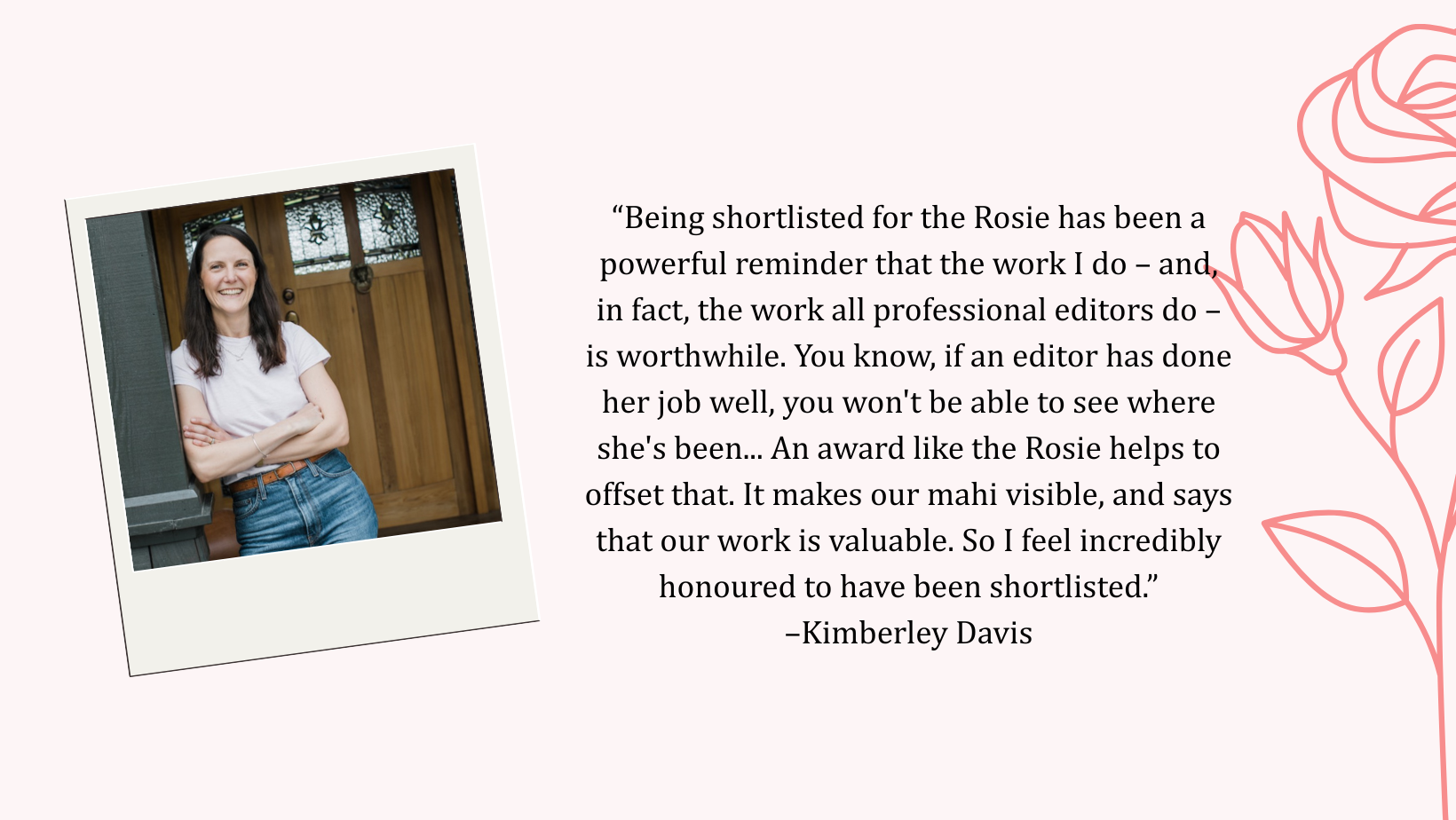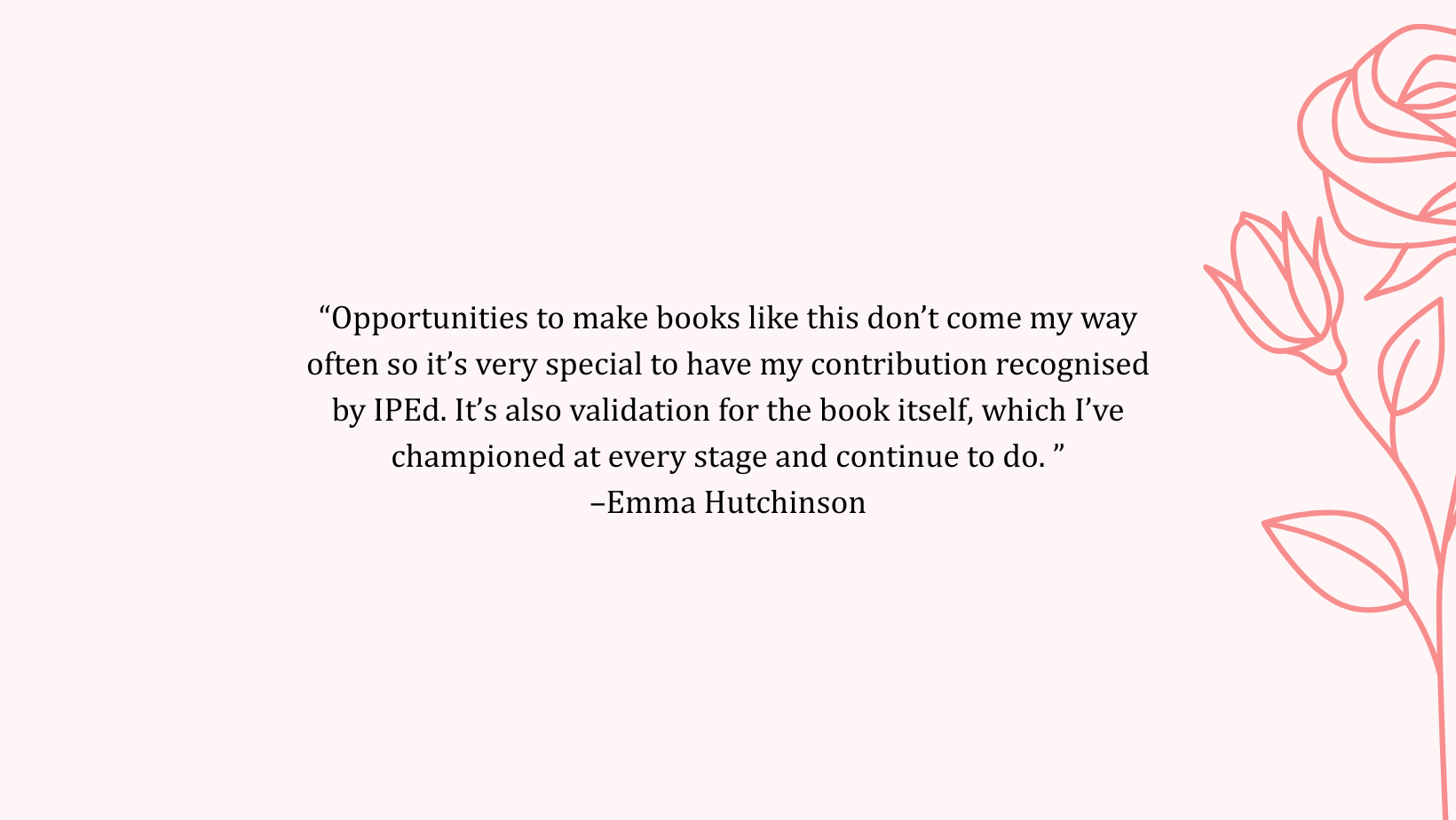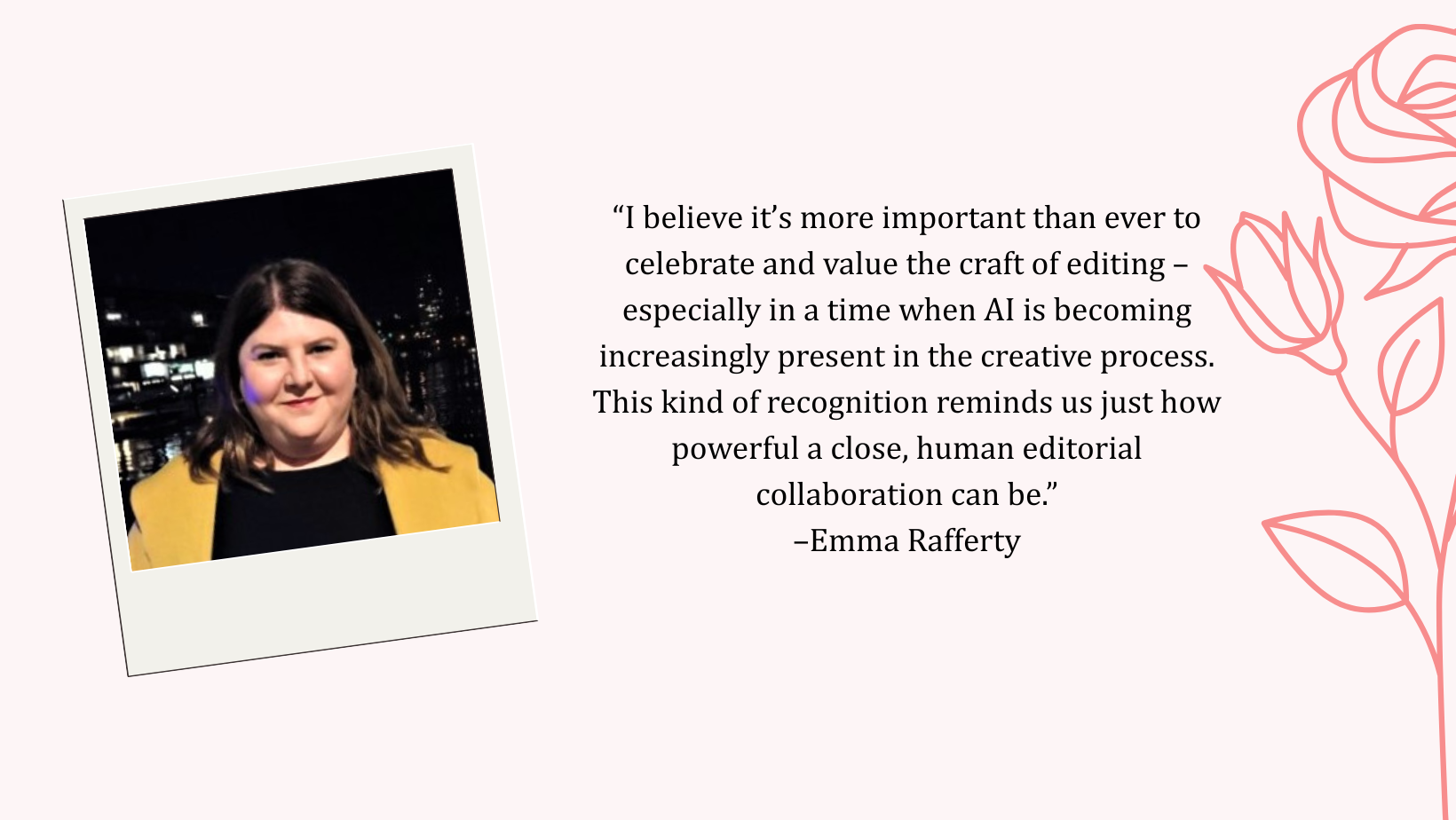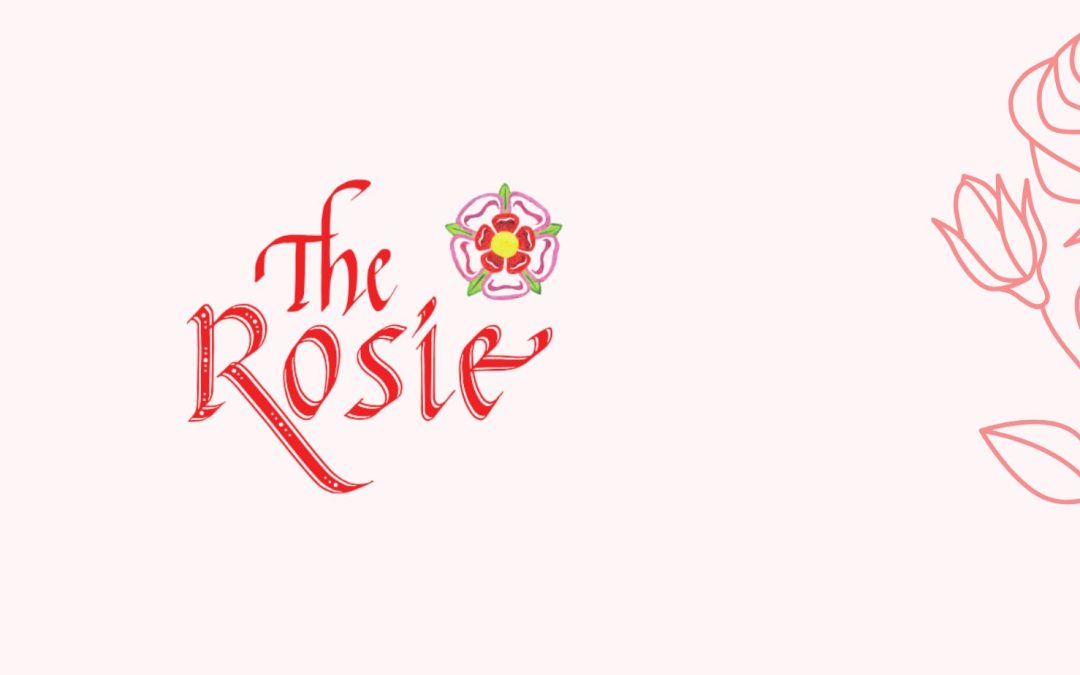Last month we shared the shortlist for the 2025 Rosanne Fitzgibbon Editorial Award, known as “the Rosie”. This month, we spoke to each of the shortlisted editors to learn a little more about them and the project they were nominated for.
Kimberley Davis was shortlisted for Under the weather: a future forecast for New Zealand by James Renwick (HarperCollins New Zealand).
Tell us about your editing career so far.
I have a Bachelor of Arts with First Class Honours in English Literature, a Graduate Certificate in TESOL and a Graduate Diploma in Publishing. I am currently undertaking a Graduate Diploma in Education (Secondary School). I’ve always been drawn to storytelling, and that’s what’s guided me through my tertiary education journey – I love learning other people’s stories, and getting to play a role in empowering and sharing those stories. I feel very fortunate to have been able to do the work I do.
I have worked in book publishing for over a decade and in-house for a wide variety of publishers, including Penguin Random House UK, Penguin Random House NZ, Allen & Unwin Aotearoa NZ, Massey University Press and Gecko Press.
For the past seven years, my brilliant sister Claire and I have run our own editing and writing business, Little Owl. And it’s been our absolute pleasure to work with trade publishers, film festivals and private clients from all over the world, not to mention an incredible and inspiring range of authors.
I now live in Wānaka, in Te Waipounamu, with my husband and two young children. But I have also lived and worked in Spain, France, Canada and the UK.
The judges highlighted your valuable contributions to structure, storytelling and the smooth flow of ideas in what was an “open and ambitious” project. They also noted your strong rapport with the author. The latter would appear essential for the former to be so impactful. How did you build that rapport with the author?
I really love working one-on-one with authors, especially when a publisher gives me a clear brief then leaves me and the author to it. This was very much the case with James’s book – and here, I have to give a shout-out to the publisher, Holly at HarperCollins, who was the one who trusted me in this instance (as she has in so many others).
This trust on the part of the publisher is, in my experience, an important first step in building rapport with an author. By respecting that you, as a professional editor, will do the right job and do it thoroughly, a publisher also gives you the space to build a genuine and meaningful relationship with the author. And I think that’s always where the magic happens!
The other key part of building a rapport with an author is taking the time, before you dive into editing their work, to really understand who they are and what it is that they are trying to say. Why have they written this book? What do they want readers to take away from it? What is their personal story, and how does that play a part in the book they’ve written? All of this – even if it isn’t actually included in the book itself – should inform your approach as an editor, because building a rapport with an author (as with anyone) lies firmly in truly seeing them and their work. In the case of James’s book, his anecdotes and personal voice were something I felt it was important to draw out and make a bigger part of the book, as doing so made the story of climate change more personal and compelling.

The judges also mentioned that you “demonstrated a strong awareness of audience”. How did this awareness shape your work on the project?
There are two things that I use to guide my editing approach: the author’s intended message (as described above), and the publisher’s intended reader. Keeping these two things in mind – and finding a balance between them – helps with making clear editing decisions (rather than personal-preference decisions). I think it’s also one of the most useful ways, as an editor, to ensure you uphold the integrity of an author’s distinctive voice while also delivering a manuscript that fits the publisher’s brief. So, hopefully, in the end everyone is happy with and proud of their book!
Where were you when you found out you had been shortlisted for the Rosie? And what does being shortlisted for the award mean to you?
I was at home, working late after my kids had gone to bed, and I was thrilled. At almost the same time, my sister messaged congratulations, because she’d seen it in B+P – and then I had messages from some of my Australian clients, which was really lovely.
Being shortlisted for the Rosie is incredibly meaningful to me. For the past seven years, I’ve worked remotely, in a small mountain town, a long way from the big centres and big publishers – and, at the same time, I’ve had two kids, been raising them with my husband, and trying to juggle everything that comes with that. I am so very grateful I have had my sister Claire through it all, and the work we do together at Little Owl, because if I’m really honest it has been incredibly tough at times. Without Claire in particular, I might have given up on editing a long time ago! I have been so fortunate to work with so many inspiring and generous authors and editors, but being a contractor isn’t always sunshine and roses. It’s uncertain, and can be incredibly fickle. At times I have felt very isolated, and have definitely had my moments – moments where I have really questioned my work as an editor, and whether what I do matters at all.
Being shortlisted for the Rosie has been a powerful reminder that the work I do – and, in fact, the work all professional editors do – is worthwhile. You know, if an editor has done her job well, you won’t be able to see where she’s been. But this invisibility can be a bit of a conundrum: it’s evidence of a job well done, based on the absence of evidence! This can make it hard to pinpoint to those outside the industry why an editor matters, and what we contribute. An award like the Rosie helps to offset that. It makes our mahi visible, and says that our work is valuable. So I feel incredibly honoured to have been shortlisted.
Emma Hutchinson was shortlisted for Getting to know the birds in your neighbourhood by Darryl Jones (NewSouth Publishing).
Tell us about your editing career so far.
I’ve worked in publishing for my entire professional career and, as with everything else at this stage in my life, it’s hard to comprehend just how long that’s been – in this case, over 25 years. Back when I started, editors were fortunate to be trained in-house and my first two jobs were learning the craft in educational and legal publishing. Since then, I have mainly worked in-house at trade publishing houses with occasional stints as a freelancer. I’ve always worked as a nonfiction editor, with a special fondness for illustrated books.
The judges noted that Getting to know the birds in your neighbourhood benefited from your expertise in image research and permissions and your understanding of graphic design and production costs. How did this knowledge and experience shape your work on the project?
I originally trained to be a graphic designer and then switched to a communications degree, specialising in journalism. I’ve found my interest in both these two disciplines combined beautifully into a role as a nonfiction editor, especially on illustrated books.
I’ve been lucky in my career to be able to develop my project manager role to include some responsibility for the design. I’ve managed highly conceptual illustrated books where writing to length, paginating and flatplanning were integral to the initial stages, setting things up for the design work. I’d then work with the designer in the Indesign files, building page proof rounds together. One of my early publishing roles was as a permissions editor and that experience continues to be put to good use. I’ve also worked as a commissioning editor so know how to cost a project. Picture research is something that I love doing and can tackle from both an editorial and design perspective. This project allowed me to utilise all these skills.

They also noted your strong rapport with the author, a relationship which clearly had a significant impact on the project. What advice would you give to other editors on how to develop that rapport with an author?
This was one of those rare projects that I felt I could happily work on forever (author Darryl Jones might not agree!), but no matter what it is, you’ve got to let the book you’re working on get under your skin.
I’m always in awe of authors for their achievement in writing a manuscript – their discipline, their passion and their commitment. As an editor, it’s your responsibility to take that on and share it with them, no matter what the material is. It’s also important to guide them through the process and celebrate the milestones – I can’t imagine what it’s like for authors to receive an advance copy of their book, but when you work closely together you get to experience some of the excitement and sense of achievement as well.
Where were you when you found out you had been shortlisted for the Rosie? And what does being shortlisted for the award mean to you?
I’m your stereotypical editor – I don’t tend to put myself forward for particular recognition, so I’d like to thank my colleague and friend Sophia Oravecz for encouraging me to apply. I was at work when I found out. It was pretty fantastic. Better still was reading the judges’ comments. Their understanding of my role and thoughtful comments mean a lot. Opportunities to make books like this don’t come my way often so it’s very special to have my contribution recognised by IPEd. It’s also validation for the book itself, which I’ve championed at every stage and continue to do.
Emma Rafferty was shortlisted for her work on the novel 17 years later by JP Pomare (Hachette Australia).
Tell us about your editing career so far.
I have now worked in publishing for more than two decades. I got my start as a production editor in legal publishing, where I worked for about seven years ultimately in a managing editor role. After that, I moved over to trade publishing, first as an in-house editor, then again as a managing editor. I took a four-year break from publishing and had two non-publishing roles where I still worked closely with writers (at the Indigenous Law Centre at UNSW and at the Australian Writers’ Guild). I then returned to editing books as a freelancer, and later to in-house work as Editorial Manager at Hachette Australia. In May 2025, I started a new role as Commissioning Editor at Pan Macmillan Australia.
The judges noted that your strong editorial insight into key story issues of pacing, plotting and characterisation transformed the pivotal story elements while also preserving the author’s voice. How do you balance the readers’ expectations of those story elements and the author’s voice across a project?
For every book and author, the approach varies, but the core principle remains the same: to respect the author’s vision, voice and creative intentions, while also advocating passionately for the reader and their experience of the story.
In most cases, the editorial notes I offer align closely with the author’s own instincts – often touching on areas they were already hoping to develop further but hadn’t yet fully explored. My aim is to shine a light on those elements and help bring them forward in a way that strengthens the book as a whole.
Some authors prefer questions over suggestions, using them as prompts to think differently about their work. Others welcome a more collaborative dialogue where we explore possible ideas together. Preferences also vary when it comes to process – some authors like detailed written feedback, while others prefer talking things through.
Ultimately, the most important thing to remember is that the manuscript is, first and foremost, the author’s – a reflection of their creativity, craft, time and care. My role as an editor is to support and elevate that vision, not to override it.

The judges also highlighted your extensive fact-checking across the project. Can you share a little about that process and your approach to it?
Fact-checking is a vital part of the editorial process, especially in fiction, where factual accuracy helps ground the story and gives it authenticity. Even in a fictional story, small factual errors can break the reader’s suspension of disbelief and pull them out of the narrative.
I genuinely enjoy this part of the work – it’s often like solving little puzzles, and it certainly leads to an interesting browsing history! There’s real satisfaction in helping an author avoid a factual slip by catching a small detail others may have missed.
That said, I want to give a huge shout-out to the freelance copyeditors and proofreaders I work with – they are some of the most meticulous and insightful fact-checkers and continuity spotters I know. Their work is invaluable, and editorial is always a team effort.
Where were you when you found out you had been shortlisted for the Rosie? And what does being shortlisted for the award mean to you?
I was at my desk at work when I got the call from publisher Rebecca Saunders letting me know I’d been shortlisted for the Rosie Award – such a lovely surprise!
I was absolutely thrilled, for several reasons. First, I’m incredibly proud of JP Pomare’s 17 years later – it’s a brilliant book and was a joy to work on. Second, it’s always meaningful to see the hard work that goes into shaping a manuscript, from both author and editor, being recognised. And third, I believe it’s more important than ever to celebrate and value the craft of editing – especially in a time when AI is becoming increasingly present in the creative process. This kind of recognition reminds us just how powerful a close, human editorial collaboration can be.
All that said, the very best part has been the messages of support and congratulations from friends and colleagues across the industry — it really means a lot.
The 2025 Rosie winner will be announced at the 2025 IPEd Conference.

